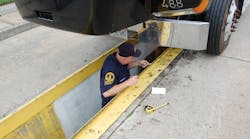I can't recall exactly how many times I have used this space to talk about the importance of brake maintenance, but I know it is a subject I have returned to on more than one occasion.
I need to do it again now because of the recent announcement from the Commercial Vehicle Safety Alliance (CVSA) regarding the designation of Sept. 16-22 as the days for its annual Brake Safety Week. This year CVSA is once again devoting a whole week to the brakes issue; last year it had cut back the inspection blitz to just one day. I don’t know why they chose to return to a weeklong blitz, but I, for one, think it’s very important that we should focus extra attention on brake maintenance for a full week each year.
By way of background, inspectors will be performing Level I inspections, which are the most comprehensive, but they will be paying special attention to brake components. In the press release announcing the event, CVSA said: “Properly functioning brake systems are crucial to safe CMV operation. Brakes must be routinely inspected and carefully and consistently maintained so they operate and perform to the manufacturer’s specifications throughout the life of the vehicle. Improperly installed or poorly maintained brake systems can reduce braking efficiency, posing serious risk to public safety on our roadways.”
I couldn’t have said it better myself.
It’s not too early for you to start preparing for this event. Make sure your PMIs include a thorough inspection of all braking components. Take a cue from CVSA inspectors and have your technicians look at the things they will be inspecting: loose parts, missing parts, air or hydraulic fluid leaks, condition of the rotor, proper pushrod travel, air chamber sizes across axles, worn linings, pads, drums and rotors, etc.
Remember that if brakes are found to be defective or out of adjustment, the vehicle will immediately be placed out of service.
In last year’s one-day brake safety blitz, 14% of the inspected trucks were placed out of service for brake-related issues.
And if that isn't incentive enough for you to ramp up your brake maintenance, consider this statistic from the Federal Motor Carrier Safety Administration’s Large Truck Crash Causation study: 32.7% of large trucks with pre-crash violations had brake problems.
CVSA says the goal of Brake Safety Week is to reduce the number of crashes caused by poorly maintained braking systems. I think that is something we should all be striving for. Do your part.



